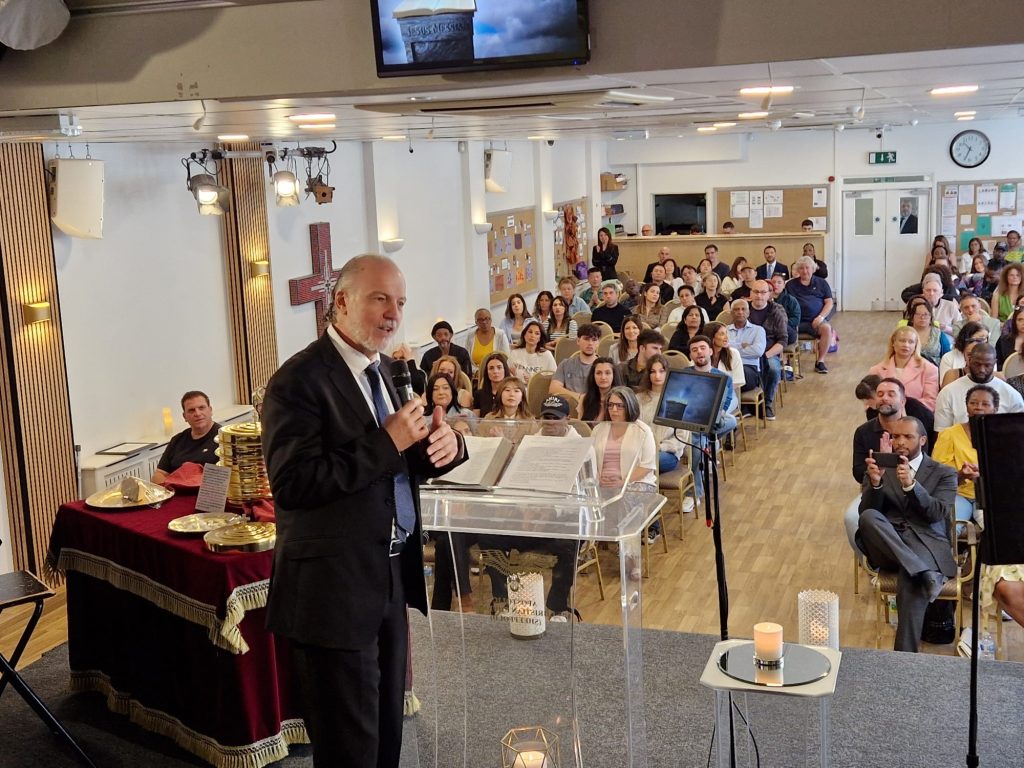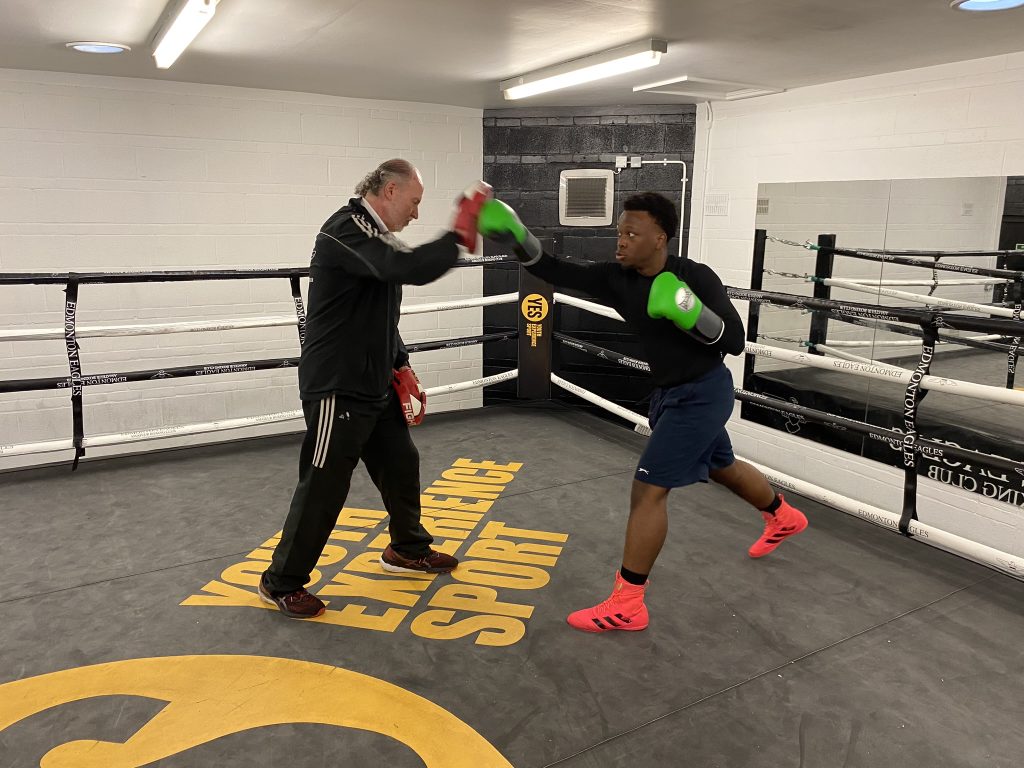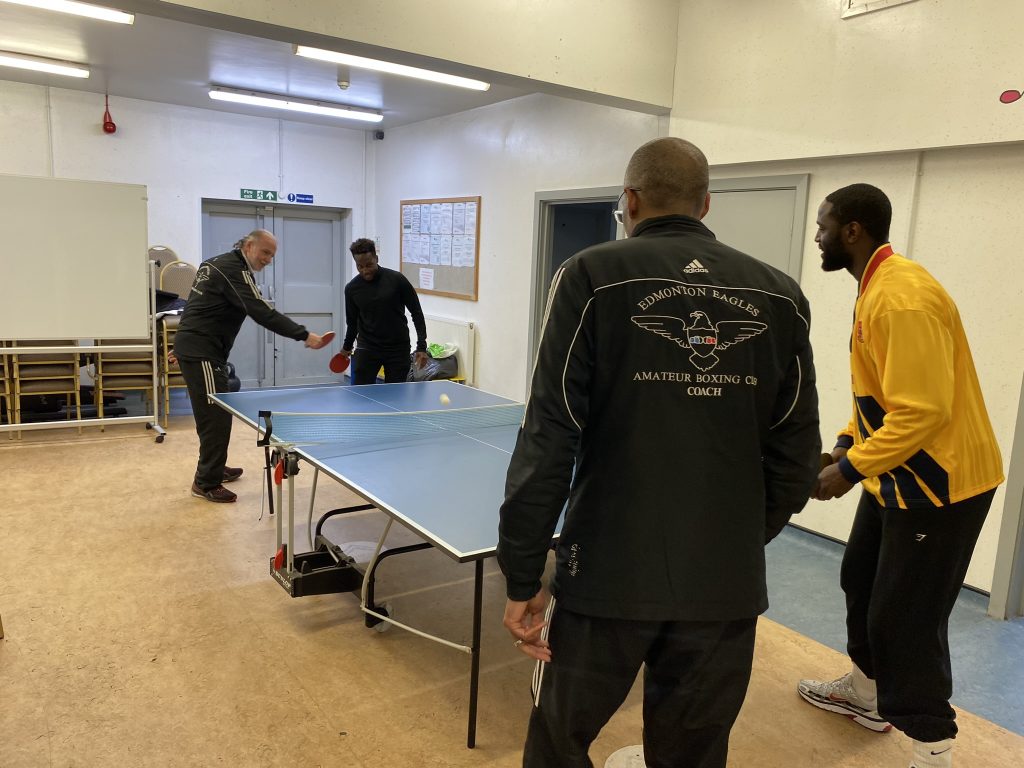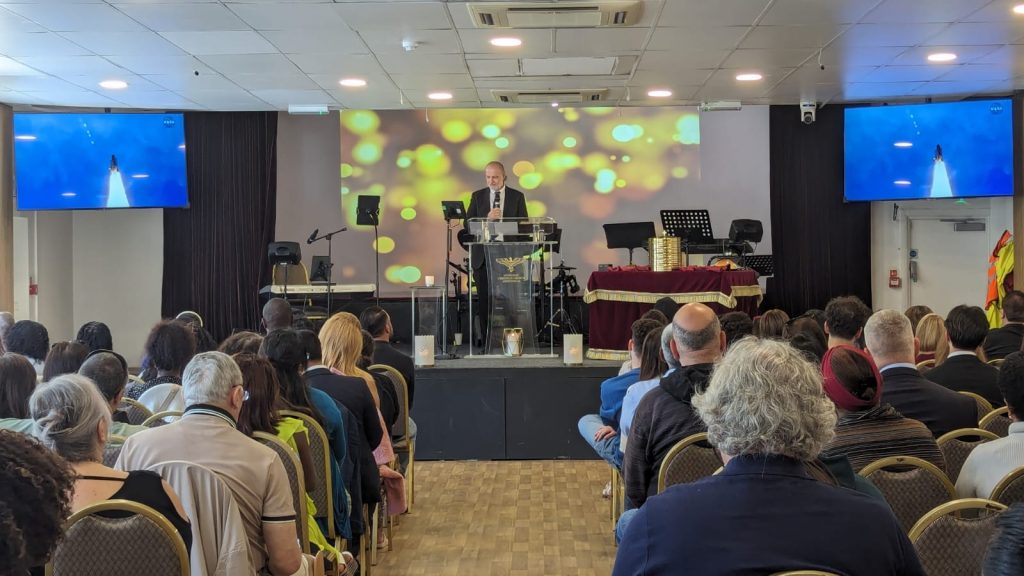SF-H: Archbishop, thank you for the invitation to the Edmonton Eagles Amateur Boxing Club. Please introduce yourself to our ‘readers’.
AC: Hello. I’m Archbishop Costakis Evangelou. I lead the Ixthus Church Council (ICC), which is a member church of CTE. I’m based in Edmonton north London. Originally from Cyprus, I grew up in England and my journey was quite diverse. I studied through the traditions, Church of England, Roman Catholic, Orthodox and then I ended up with my Pentecostal expression where I am now. It’s been a bit of a rollercoaster journey. I’m happy where I am now. I feel fulfilled in what I do.
SF-H: How did you come to the Pentecostal tradition?
AC: It was through witnessing a Christian sister who was from my home country, Cyprus. Growing up I was more streetwise, I didn’t understand entirely what was going on in church, and I never had the catechisms. We weren’t really attending church growing up, just on special occasions. And it was that sister, from the church you belong to, Shermara, The Church of God of Prophecy. She was speaking about her relationship with the Lord. I went along and I had my first real connection. Seeing people praising and worshipping the Lord had a big impact on me. It awakened my spiritual thirst to know more, to understand and have a relationship with God. A personal one, as opposed to a relationship mediated by a priest or someone standing in between. That’s how I am ‘wired up’ to receive. Different people are comfortable with different traditions, for some people it’s a liturgical tradition, others are comfortable with more quiet, for others there’s a lot going on, people speaking tongues, loud music, praising out loud. That expression of worship resonated more with me and that was the beginning of my journey that led me to our church, the one I’m with now.
SF-H: What inspired you to found a church?
AC: There wasn’t an intention to found an actual church. I felt there was a type of need and there were a lot of people around wanting to come together and work with me. It was a natural thing and one thing led to another. We were having prayer groups and Bible studies. We felt comfortable with the people around us. There was quite big community growing and they felt they wanted a church to express what we were doing, to be more formal. We were just meeting in homes, and they wanted to find a base, a building that we could meet in. It was organic. I believe God was in the mystery.
Some of our pastors now are from that era, 30 years ago. They’ve been with us since the beginning and helped us develop the church. The church is diverse. We’re multinational, from different backgrounds. We use the Bible as the basis of our development. We align with the word of God.
We’re experiencing quite a big revival at the moment. People are really searching for the purpose of life. I had five baptisms last week. Every week we have one or two, sometimes up to ten baptisms. We have people from China coming over here and we have a Chinese branch as well. So, I’ve had the Bible translated into Mandarin Chinese. Five or ten years ago I didn’t plan that we’re going to have a Chinese branch, but we have. Through AI technology my sermons are processed, and I now speak in Mandarin Chinese. But it’s not me, it’s the AI. We’re always adding things.
SF-H: Reflecting on the state of the world now are people looking for some sort of direction?
AC: Definitely. There’s a lot of confusion around. What I believe the Gospel gives to the community and to the world is direction, clarity and also love. There’s a prophetic element to the church as well. The Bible is a unique book. It talks about past, present and the future.
What we focus on is God’s love and God’s reconciliation. We don’t fearmonger people about prophecy, about how it’s going to be the end of the world. We talk about the character of Jesus Christ; we discuss him as a person. People want to know more, so they attend church, and they grow. Then they want to make that commitment for themselves – to be a part of God’s purpose, God’s plan.

SF-H: Can you describe the scope and responsibilities of your jurisdiction of your role?
AC: I wear many different hats! My responsibility is to coordinate our leadership team. We have about 50 people who all have different responsibilities within the community. For example, in here it’s not just the boxing club in here; it’s a food bank on a Monday and Wednesday. Every Thursday we have a soup kitchen. We have between 50 and 80 people every week coming to have food and there are witnesses here at the same time to talk to people about faith.
Then I have my other responsibilities to oversee the church ministry with the senior minister of the church, Penny. I’m a registrar, so we do weddings. I’ve got a funeral service on Tuesday. Tonight, I have a Bible study.
I represent the church on many different platforms as well, like at CTE. I have international responsibility as within our church we have people who engage with ministries across Africa. In our ICC network we have churches in Ghana, Uganda, Kenya, Nigeria and South Africa.
ICC is an umbrella organisation for independent churches. Giving them structure, direction, support, and mentoring. It’s about helping them identify and serve their local community. We’re a resource. If there’s anything they need to know about church governance. Even practical things, like they want to acquire a building. How can they fund it, or apply for a change of use? We give them that information. It’s all free because of their membership.
Talking to you about it I don’t know how we fit it in! It’s a joy, everything I do. It’s all connected. I just love everything I do in the church and in the community. It’s fulfilling. You want to have a positive impact on someone’s life every day. That’s the way I like to live my life.
SF-H: What in your view distinguishes the Ixthus church from other denominations?
AC: Everyone has their own way of expressing their faith, so the missions work in different ways. We are more ‘out there’ – in the community. We are more spontaneous. I’m not a conventional person in ministry. My motive is to impart something positive and to build relationships with people that would never have been approached maybe if I was just to close myself in, where my vestments, my collar and things. When I speak in colleges and schools I go in a tracksuit. You know Judas had to point Jesus out because he didn’t look different to the other people around him.
SF-H: What challenges are there in your community?
AC: People are struggling financially. The foodbank is not just for homeless people; it’s for families. The rents have just shot up and mortgages have gone triple what they were before.
Another challenge we have here is antisocial behaviour. There used to be more crimes around this area. We’ve helped with gangs to diffuse tensions. Education is an issue as well. There are pupils that are not really progressing, so we work with local schools. We work with mentoring units, we do the boxing, but we also do life skills with pupils and engage them in conversations.


SF-H: You’re known as the ‘Boxing Bishop’. Where is the synergy, do you think, between Christianity and boxing?
AC: What connects them is because we’re working with people who are on a journey. A lot of the youngsters who are coming here to box have no education. They have fallen out of school, and they can’t relate to authority. I see that Jesus went out to connect with people who weren’t educated. James and John were fishermen, they weren’t at rabbinical university. So, connecting with people at the grassroots that’s where I feel Christ would be. Some of the people coming in here are very rough around the edges. They come here and slowly their character changes. They go out a different way.
I’ll give you a testimonial. There was this young man coming in to box at the free sessions at half four in the afternoon. I won’t say his name, but he was a Somalian boy, a Muslim. You could see he was troubled and was challenged by life. He kept getting into problems with the police. He came here and he took boxing seriously and he got to the stage where he was really good. After a couple of years, we had a show at Lee Valley. He got into the ring, started competing and there was a police officer who recognised him because two years before he had arrested him. Then he was cheering for him to win and after they finished, we got them together. That boy now wants to be a professional boxer.
When we first started the boxing people questioned how can you reconcile your teaching people to hit each other and your preaching the gospel. “It really works in the opposite way,” I said. It stops people hitting each other. As opposed to being aggressive, a person’s attitude changes. It’s about becoming disciplined, and respecting each other. We promote self-control. It’s about how people can learn to work with other people in spite of them being different. I believe Christ uses everything to change people’s lives.
I work with a group called Doves and Gloves in Israel. It brings Palestinian boys and Jewish boys together. They compete in the ring with each other, and they build relationships. Through boxing we engage with people who otherwise would never come to a church.
Now, I don’t box myself. I’m a manager. My sons were both professional boxers and I managed them.
SF-H: The theme of your recent spring conference was “20 people build; one person destroys.” Could you share something about that theme?
AC: I used the blueprint that to build a house you need many people. You need an electrician, you need a plumber, you need bricklayers. It takes weeks and months to build but it only takes a few moments to destroy it. So, we used that as a warning to be careful who you put in your ministry team. Don’t just pull people in because they’re your friends or they’re your family. Make sure that God has called them into that role, into that responsibility. Over the years, through the Council, I’ve experienced ministries fall apart when they’ve got the wrong people involved. You need the spirit of discernment. You see people starting ministries not to serve God but to benefit themselves. We established the Council to help people to discern and work together so their churches are not just a flash in the pan.
We’ve been ministering since 1996. We started with a little room of six people. Since we began, we’re out serving the community, every week, because we love the Lord.
SF-H: In your local community how do you work alongside other traditions and churches.
AC: We have a very good local network. We have a strong interfaith group with the mosque and the synagogues and the other faith groups – we’re all joint stakeholders in the area. We might have different faith systems, but we still have common things that we want like safety for our families.
I’m unconventional. It doesn’t go well with some Christian groups, but before Covid the local imam asked if they could break the fast at our church. “Can our musicians play with your musicians?” he asked. And that’s what we did here. I want to build positive relationships. It doesn’t threaten my faith because I know what I believe and if it wasn’t for Christ I wouldn’t be able to be here now. All I can do is present a Christ-like character through my limitations and let God do the rest.

SF-H: How do you envision your church after the next 65 years?
AC: I hope we can instil the values of being Christ-centred. To make sure everything is done for the well-being of people and to be inclusive, not exclusive.
God’s given me my vision. God will speak to other people. And that might add to what we’re doing or take it in some other direction. All I can say is I want to make sure that the people who we pass it onto share that vision, that love for the Lord and are selfless.
SF-H: CTE has a strong emphasis on encouraging young adult leadership. What’s your overall vision for this?
AC: We let the young people be involved in the church services. Once a month we have the youth ministry taking an aspect of the service. In our church we promote participation, not spectatorship. It’s a way of life so our connection is not just on Sunday. We’re very much about getting the young people involved and active in church life. And church life is not the building, it’s everywhere we go and everywhere we engage.
SF-H: What is your vision of ecumenism and how is it manifested within your church council?
AC: As I said, some people are comfortable in one kind of expression of church, other people are comfortable in another. It’s not either/or it’s and/and. When you look at portraits in different colours you need one colour to highlight the other colour and that’s how I look at ecumenism. Celebrating that, being able to be comfortable with that. When I go on retreat for my own time of reflection I go to Mount Athos. It’s a monastic area. There’ve been monasteries for more than a thousand years. It’s Orthodox. I go there for 3 or 4 days. It’s very ritualist and liturgical and I feel good there. There’s a place for everything.
I see that we’re all part of the bigger picture, a bigger plan. Everyone has their value. I know the other traditions. I respect everyone, but I equally I’d like people to respect my tradition.
SF-H: Is there a leader from outside of your own tradition who has inspired you?
AC: There have been a few church leaders or church ministers who’ve inspired me, not all of them well known. That lady in the Church of God of Prophecy back in the 80s, who first inspired me and instilled great values in my life. Another person who inspired me, that people may not realise, is Archbishop Gregorios. I spent time in the archdiocese. He was really loving, very supportive and he was very humble. There was no arrogance about him as an Archbishop. When we sat down together, he’d give me food to eat first before himself. From the monastic perspective, there was a man who’s now gone to be with the Lord, Nikitas, who was a watchman for a monastery called Iviron on Mount Athos. That’s people from my traditional background. Coming forward now, people like Billy Graham and I went to his crusades when he was in Wembley and when he came back. Archbishop Angaelos, I respect him. Throughout my journey, there’s been people from different traditions. I like to take good things from people and apply them to my own life.
SF-H: Throughout this whole interview you’ve spoken about how ecumenism is part of your spiritual DNA and your Christian journey…
AC: Yes, there is richness in every tradition. You’ve got to celebrate that. It’s not them and us; it’s us. If there’s ever a time that the church should be united, it is now. We can learn from each other. Not just tolerate, but celebrate each other.